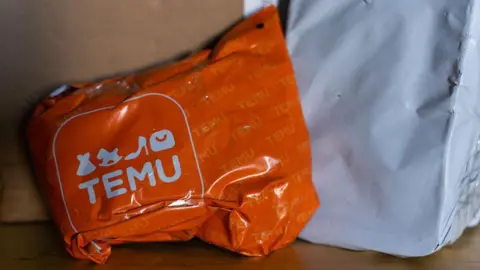Temu to stop selling goods from China directly to US customers
 Getty Images
Getty ImagesTemu has said it will stop selling goods imported from China in the US directly to customers from its platform.
The online marketplace said sales would now be handled by "locally based sellers", with orders fulfilled from within the country.
The move comes as a duty-free rule for low-value packages is closed.
Temu, and rival Chinese retail giant Shein, had previously relied on the so-called "de minimis" exemption to sell and ship low-value items directly to the US without having to pay duties or import taxes.
Temu said it had been actively recruiting US firms to join the platform.
"All sales in the US are now handled by locally based sellers, with orders fulfilled from within the country.
"The move is designed to help local merchants reach more customers and grow their businesses," it added.
Supporters of the de minimis loophole, which applied to parcels worth less than $800 (£600), argue it helped streamline the customs process.
But both Trump and his predecessor, Joe Biden, said it damaged American businesses and was used to smuggle illegal goods, including drugs.
What was the de minimis exemption?
De minimis is a Latin term, which loosely translates to English as "of the smallest".
In this context it refers to a US trade rule enacted by Congress in 1938 to avoid the expense of collecting only small amounts of import levies.
In the 21st Century, after a series of rises to the threshold, it allowed retailers to ship packages worth less than $800 to US customers without having to pay duties or taxes.
Shipments under the exemption accounted for more than 90% of all the cargo entering the US, according to the country's Customs and Border Patrol (CBP).
 Reuters
ReutersChinese online retailers like Shein and Temu had benefited greatly from the loophole.
Both platforms attracted millions of US customers with marketing blitzes that showcased their ultra-low prices
And it was the de minimis exemption that helped them offer those deals so cheaply.
Shein did not immediately respond to BBC requests for comment.
Last month, in almost identical statements, Shein and Temu said they had seen operating expenses rise "due to recent changes in global trade rules and tariffs", adding they would make "price adjustments" from 25 April.
Why has Trump closed the loophole?
In February, Trump briefly closed the loophole.
The suspension was quickly paused as customs inspectors, delivery firms and online retailers struggled to adapt to such a major change at short notice.
During the initial suspension of the exemption the US Postal Service temporarily stopped accepting parcels from mainland China and Hong Kong.
The executive order announcing the latest move said it was aimed at tackling the illegal importation of synthetic opioids like fentanyl.
It said many Chinese shippers use deceptive practices to hide illicit substances in low-value packages "to exploit the de minimis exemption".
"These drugs kill tens of thousands of Americans each year, including 75,000 deaths per year attributed to fentanyl alone," it added.
The idea is not new. Last year, the Biden administration proposed rules intended to stop "abuse" of the exemption.
"The growing volume of de minimis shipments makes it increasingly difficult to target and block illegal or unsafe shipments," it said.
The move is in line with Trump's policies of cracking down on goods from China.
Since returning to the White House in January, Trump has imposed taxes of up to 145% on Chinese imports. His administration said in April that when the new tariffs are added on to existing ones the levies on some Chinese goods could reach 245%.
US authorities have also blamed the success of firms like Temu and Shein for putting strains on border authorities, as the number of packages entering the US under the loophole surged from about 140 million a decade ago to more than one billion last year.
What does it mean for online shoppers?
Packages sent to the US from mainland China and Hong Kong with a value of up to $800 now face a 120% tax rate or are subject to a flat fee. The fee started at $100 and is due to rise to $200 at the beginning of June.
Even before these packages were subject to import taxes, US consumers were warned of potential price rises.
The American Action Forum, a right-leaning policy group, estimated last year that getting rid of the exemption would result in "$8bn to $30bn in additional annual costs that would eventually be passed on to consumers".
Chinese online retailers have also benefited from similar rules in the UK and the European Union.
In a move mirroring the US action, the UK has announced a review of low-value imports coming into the country.
In the UK, the current rule allows international retailers to send packages to the UK worth less than £135 without incurring import taxes.
Chancellor Rachel Reeves said the cheap goods are "undercutting the British High Street and British retailers".
The European Union has also proposed plans to scrap duty-free exemptions for parcels worth less than €150 (£127.50; $169.35).
Which means consumers in the UK and EU could soon also see prices rising.
Will US border checks change?
Packages that arrived in the US under the exemption were inspected in the same way as other goods, including being checked for illegal substances. And most synthetic opioids are brought into the country through the border with Mexico, according to officials.
Some experts think ending the exemption will do little to curb illegal drugs and not address the challenges faced by US manufacturers.
There are also concerns the move will create more work for US border officials, who are already stretched as they try to stop drug smuggling.
According to pro-open trading association the National Foreign Trade Council (NFTC), removing the de minimis exemption would "shift the CBP's focus away from the border, where a vast majority of illegal substances and products are entering the country."
"CBP would need to hire and train new personnel, costing the agency millions or causing them to move agents from the already overburdened southern border," it added.
